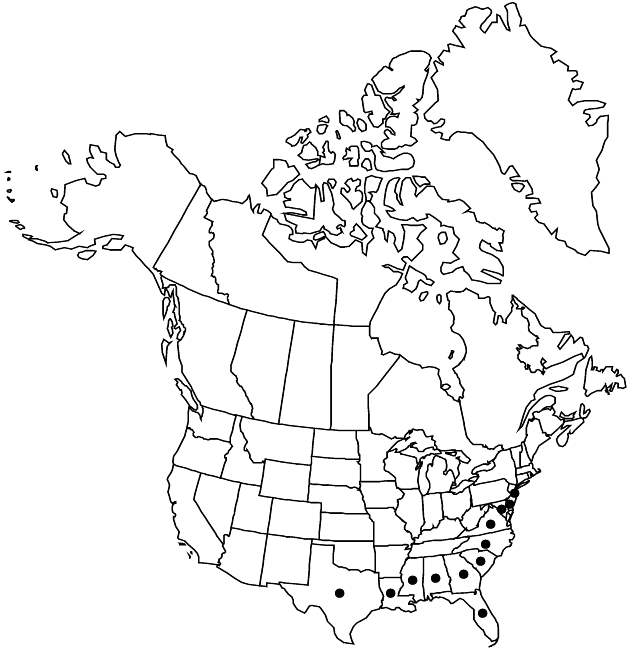familyAsteraceae
genusSolidago
sectionSolidago sect. Solidago
subsectionSolidago subsect. Maritimae
speciesSolidago stricta
subspeciesSolidago stricta subsp. stricta
Difference between revisions of "Solidago stricta subsp. stricta"
Synonyms: Aster flavovirens Kuntze Solidago chrysopsis Small Solidago flavovirens Chapman Solidago stricta var. angustifolia (Elliott) A. Gray
FNA>Volume Importer |
FNA>Volume Importer |
||
| Line 7: | Line 7: | ||
|name=Aster flavovirens | |name=Aster flavovirens | ||
|authority=Kuntze | |authority=Kuntze | ||
| − | }}{{Treatment/ID/Synonym | + | }} {{Treatment/ID/Synonym |
|name=Solidago chrysopsis | |name=Solidago chrysopsis | ||
|authority=Small | |authority=Small | ||
| − | }}{{Treatment/ID/Synonym | + | }} {{Treatment/ID/Synonym |
|name=Solidago flavovirens | |name=Solidago flavovirens | ||
|authority=Chapman | |authority=Chapman | ||
| − | }}{{Treatment/ID/Synonym | + | }} {{Treatment/ID/Synonym |
|name=Solidago stricta var. angustifolia | |name=Solidago stricta var. angustifolia | ||
|authority=(Elliott) A. Gray | |authority=(Elliott) A. Gray | ||
| Line 31: | Line 31: | ||
|elevation=0–100 m | |elevation=0–100 m | ||
|distribution=Ala.;Del.;Fla.;Ga.;La.;Md.;Miss.;N.J.;N.C.;S.C.;Tex.;Va.;Mexico;Central America (Belize;Guatemala). | |distribution=Ala.;Del.;Fla.;Ga.;La.;Md.;Miss.;N.J.;N.C.;S.C.;Tex.;Va.;Mexico;Central America (Belize;Guatemala). | ||
| − | |discussion=<p>Subspecies stricta occurs near the coast and never has elongate branches in the arrays unless the leader is damaged. It is found on the outer coastal plain from Delaware to Texas. A. Cronquist (1980) thought that Solidago flavovirens might be S. gracillima (S. stricta subsp. gracillima) or perhaps a hybrid with S. sempervirens.</p> | + | |discussion=<p>Subspecies stricta occurs near the coast and never has elongate branches in the arrays unless the leader is damaged. It is found on the outer coastal plain from Delaware to Texas. A. Cronquist (1980) thought that <i>Solidago</i> flavovirens might be S. gracillima (<i>S. stricta </i>subsp.<i> gracillima</i>) or perhaps a hybrid with <i>S. sempervirens</i>.</p> |
|tables= | |tables= | ||
|references= | |references= | ||
| Line 55: | Line 55: | ||
|publication year= | |publication year= | ||
|special status= | |special status= | ||
| − | |source xml=https://jpend@bitbucket.org/aafc-mbb/fna-data-curation.git/src/ | + | |source xml=https://jpend@bitbucket.org/aafc-mbb/fna-data-curation.git/src/8f726806613d60c220dc4493de13607dd3150896/coarse_grained_fna_xml/V19-20-21/V20_290.xml |
|tribe=Asteraceae tribe Astereae | |tribe=Asteraceae tribe Astereae | ||
|genus=Solidago | |genus=Solidago | ||
Revision as of 16:22, 18 September 2019
Basal leaves entire. Arrays narrow, without elongate proximal branches. 2n = 18, 36, 54.
Phenology: Flowering Sep–Nov (year-round s).
Habitat: Sandy, usually moist soils, bogs, marshy ground, open pine flat-woods, sometimes in coastal brackish marshes, outer coastal plain
Elevation: 0–100 m
Distribution

Ala., Del., Fla., Ga., La., Md., Miss., N.J., N.C., S.C., Tex., Va., Mexico, Central America (Belize, Guatemala).
Discussion
Subspecies stricta occurs near the coast and never has elongate branches in the arrays unless the leader is damaged. It is found on the outer coastal plain from Delaware to Texas. A. Cronquist (1980) thought that Solidago flavovirens might be S. gracillima (S. stricta subsp. gracillima) or perhaps a hybrid with S. sempervirens.
Selected References
None.
Lower Taxa
None.